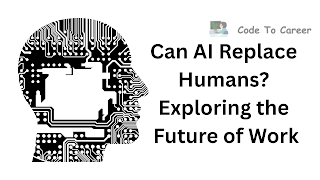Can AI Replace Humans? Exploring the Future of Work
Artificial Intelligence (AI) has rapidly advanced, infiltrating nearly every sector — from healthcare and finance to transportation and customer service. With AI systems demonstrating remarkable abilities to analyze data, automate tasks, and even mimic certain human behaviors, the question on everyone’s mind is: Can AI replace humans?
What is AI Capable Of Today?
AI today excels at handling large data sets, recognizing patterns, and performing repetitive tasks with precision and speed that far surpass human abilities. Examples include:
- Voice-activated virtual assistants like Siri, Alexa, and Google Assistant
- Autonomous vehicles navigating complex environments
- Fraud detection systems monitoring millions of transactions
- Diagnostic tools that analyze medical images to detect diseases
- Chatbots providing instant customer support
These advancements show how AI can dramatically improve efficiency and accuracy, making it a powerful tool in many industries.
Strengths of AI That Support Automation
Some of AI’s key strengths include:
- Speed and Scale: AI processes information and executes tasks at lightning speed and on a scale impossible for humans.
- Consistency: AI doesn’t suffer from fatigue or distractions, resulting in fewer errors.
- Data Analysis: AI can identify complex patterns in data that humans might miss.
- Cost Efficiency: Automating routine tasks reduces labor costs and increases productivity.
Limitations of AI: Why Humans Still Matter
Despite AI’s strengths, it currently lacks several essential human traits that are critical in most roles:
- Creativity: AI can mimic creativity by generating art or music, but it lacks genuine inspiration and original thought.
- Emotional Intelligence: Understanding, empathizing, and responding to human emotions are areas where AI falls short.
- Ethical Judgment: Many decisions require moral reasoning that AI cannot authentically replicate.
- Contextual Understanding: Humans excel at interpreting subtle social cues and adapting to new or ambiguous situations.
Jobs that rely heavily on these qualities — such as counseling, leadership, creative arts, and complex negotiations — remain difficult for AI to replace.
How AI and Humans Can Collaborate
The future is not about AI replacing humans but augmenting human capabilities. Here’s how this collaboration plays out:
- Enhanced Decision-Making: AI analyzes data and presents insights, enabling humans to make more informed decisions.
- Automation of Mundane Tasks: Freeing humans from repetitive work so they can focus on strategic, creative, or interpersonal activities.
- Personalized Experiences: AI can tailor services and products to individual preferences, while humans provide the personal touch.
- New Job Creation: AI opens avenues for roles in AI maintenance, ethics, design, and human-machine interaction.
Examples of AI-Human Synergy in the Workplace
Consider these real-world examples:
- Healthcare: AI assists doctors by analyzing scans and suggesting diagnoses, but the final treatment decision involves human judgment and empathy.
- Creative Industries: AI tools help artists generate ideas or edit content, yet human creativity shapes the final masterpiece.
- Customer Service: Chatbots handle routine queries, while humans address complex, sensitive customer needs.
Addressing Common Concerns
Many worry about AI leading to massive job losses. While some roles will be automated, history shows that technological revolutions often create new kinds of jobs and industries. The key lies in:
- Reskilling and Upskilling: Workers need opportunities to learn new skills aligned with an AI-augmented workforce.
- Ethical AI Development: Companies and governments must ensure AI systems are transparent, fair, and aligned with human values.
- Human-Centered Design: AI tools should be designed to empower, not replace, human workers.
The Road Ahead
AI will undoubtedly reshape the workplace and society. The narrative should shift from “Can AI replace humans?” to “How can humans and AI work better together?” Embracing this partnership will unlock tremendous potential for innovation, productivity, and human fulfillment.
Final Thoughts
While AI continues to advance rapidly, it is unlikely to fully replace humans anytime soon. Instead, the future of work will be a collaborative one where AI handles what it does best, and humans bring their unique creativity, empathy, and ethical judgment to the table. Preparing for this future requires adaptability, continuous learning, and a focus on human-centered technology.
What are your thoughts on AI replacing humans? How do you see this impacting your work or industry? Share your views in the comments below!





.png)




0 Comments